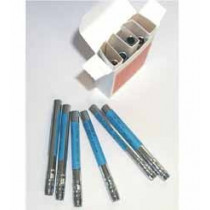No products
Prices do not include tax.
Temperature crayon
In certain thermal processes, heat-sensitive products are essential to control the temperature. Processes such as welding or vulcanization may require checking the temperature in different specific areas of a part or structure. In such a case, using a temperature crayon is the most convenient and reliable way. Applying some strokes on key points before the process starts will allow us to verify their temperature and check the results later on thanks to the permanent change of colour of the drawn lines.
Below is our selection of the best temperature indicating crayons:
Temperature crayon models
Thermal pencil for controlling temperatures. These wax-based pencils with heat-sensitive ink allow to mark any surface, which will change colour depending on the temperature.
Heat-sensitive pencil (10 units)119,70 €
How to use temperature crayons
Using these temperature indicating crayons is quite simple, since they are wax crayons that can be applied like chalk on a blackboard. Their wax-based texture makes them suitable for any surface, whether smooth or rough.
The stroke of the heat-sensitive crayon will change colour when it reaches its calibration temperature. Once the thermal process is complete, we can remove the line by sanding over it. A control part or a piece of the same material can also be marked and then discarded after the thermal process as concluded.
Sectors that use heat-sensitive crayons
Industrial trades have used heat-sensitive crayons for years. Their ease of use and their ability to control higher temperatures than self-adhesive thermal labels make them an ideal product for certain applications.Welding temperature control with heat-sensitive crayons
One of the most common uses for these temperature crayons is temperature control during welding. The welding of tubes, pipes and metal surfaces requires a specific temperature range, depending on the materials used.
Not reaching the right temperature can create a defective weld, which will lack the necessary consistency. On the other hand, if we exceed the melting temperature to carry out the welding, we may deteriorate the materials and even deform them, causing the defective finish of the welded joint.
By using heat-sensitive crayons, you can see the temperature that the welding spot is subjected to. Drawing a single stroke on the area we intend to join is sufficient. When applying heat, we will see the line change colour, so we will know exactly when we have reached the required temperature and, hence, if the welding has been done correctly.Checking rubber seals with temperature crayons
In the vulcanisation of rubber seals, we must verify that the temperature reaches 120 °C to guarantee a correctly executed process.
The vulcanisation of the seals gives them enough hardness to properly serve their hermetic sealing function. This is essential to obtain a quality product.
The main question in this type of process is making sure that the product, in this case, the seals, receive the correct temperature. Oven temperature sensors typically measure the temperature reached inside them. However, it is difficult to determine if the temperature is uniform and reaches all areas where there are parts. Since temperature crayons are specifically used on these parts, they can ensure that said parts receive the correct temperature.Advantages of temperature indicating crayons compared to other conventional sensors
- Actual temperature measurement: Applying the crayon on the specific control point ensures that we obtain a highly-accurate temperature.
- Quick and easy to use: The wax-based crayon provides the right thickness in just one stroke.
- Unassisted control of high temperatures: The harsh temperature arising in specific thermal processes makes it difficult to control in person. The part is marked with the temperature crayon before being heated. The permanent colour change is clearly visible once the work is completed and even when the part has already cooled down.
Where can I buy heat-sensitive crayons?
On our website, you can find several models of crayons that change at different temperatures to meet your needs. Choose the most suitable one and easily order it through our website. If you have any questions, or if you can’t find what you are looking for, contact our technicians through the contact form, by making a call or sending an email. We will be happy to help you and recommend the best solution.

